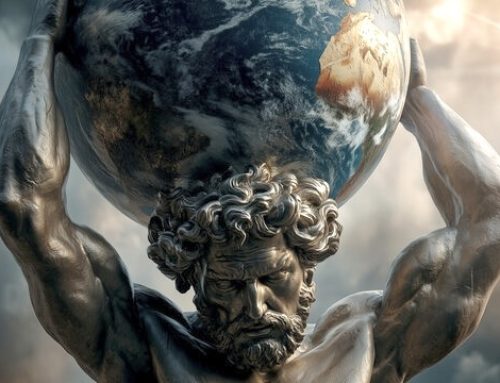Every seventy-five years or so America endures a period of crisis that lasts from twelve to seventeen years. They include both profound economic and security effects that put the country at leviathan levels of risk. The founding of our country was itself a period of crisis; later was the Civil War and Reconstruction, and in the twentieth century the Great Depression and World War II. The current period of crisis in now three years old—marked by the date our capital markets began to realize they were standing in the quicksand of credit default swaps secured by vapor and hubris. I would argue we are far from seeing the depth of the current crisis, nor are we even near a midpoint. It would be ahistorical to predict otherwise. We have yet to even seen the axe of conflict fall. No, 9/11, Iraq, and Afghanistan don’t count – at least not yet, although they probably provide the framework for much wider conflict—a wider War on Terror— with many more actors involved. I remain convinced that our capacity to start and perpetuate war far exceeds our ability to end it. The preposterous realization that we are unable to even define what a win is, is all the evidence anyone needs to defend that claim. Be that as it may, my intent here is not to debate the dilemmas that face policymakers and provide fuel for Gadarene punditry today; rather to explore what historians will later observe with the crisis behind them, as they write the inevitable story of how American identity was changed forever (or at least until the next crisis in around 2095). If we are smart, we will write a different future than historians might expect. But we better wise-up soon.
As we stumble our way by fit and spasm toward the future, we have choices about how we reckon with a world that, in the words of columnist Thomas L. Friedman is “really unusually uncertain.”[1] Those choices are largely formed based on our cognetic disposition: a combination of intellectual capital and cognitive traits, which allow us to simplify the world and make decisions. Our cognetic dispositions are formed through the processes of education, experience, socialization, and indoctrination. We also forge relationships with those similarly disposed—of similar cognetic disposition—and wage confrontation with those who differ. In America today, four major groups have formed that dominate socio-political discourse. They are: the Angry Patriots, the Faithful Followers, the Elite Globalists, and the Transcendent Epistemists.[2] Each group competes with and between the others in elections, boardrooms, classrooms, media, and the streets. Besides wrestling over resources, rights, power, and wealth, the larger and more important long-term battle will be over American identity. This battle will determine the answer to “What does it mean to be an American?”
The Angry Patriots (APs) are perhaps the most familiar, given to the volume with which they assert themselves in the media. They are a boisterous bunch – Rush Limbaugh, Glenn Beck, et al. The process of experience, as opposed to education, socialization, or indoctrination, dominate development of their cognetic disposition. They claim they are a product of the school of hard knocks. They are the torchbearers of American exceptionalism. Fear is their currency of persuasion. Mostly Republicans and Tea Partiers, they are publicly pious, although theologically shallow. God is on their side by entitlement, but while they claim humble abidance to religious proscriptions and secular law, they often behave as if their pockets are filled with dispensations. Their principal aim is to return America to the “good ol’ days” when they were on top of the socio-political pecking order in a world that (to them) is inherently hierarchical. Knowledge is nice as long as it is rooted in common sense, but loyalty is more important. Reason is often subjugated to muscularity; bigger bombs and bigger walls are more dependable than intelligence. Signs or documents written in any language other than English are an attack on their sense of patriotic purity; language is symbolic – not about communication or understanding. When challenged or threatened they favor isolation from the world. Free trade or other theories of economic specialization can only cost Americans jobs. Diplomacy is for sissies. For APs, the first clause of the Second Amendment to the Constitution, “A well regulated militia being necessary to the security of a free State” has no bearing on the second clause, “ the right of the people to keep and bear arms, shall not be infringed.” Mosques are monuments to terrorism even while Christian churches are not so to the murderous Crusades, nor are Catholic churches to pedophilia. APs employ a fair amount of libertarian rhetoric, as long as their entitlements remain—especially Medicare and Social Security. Their mantras are “America first!” … “Not on my watch!”… and “Not from my pockets!”
Faithful Followers (FFs) see the world through the lens of religion. They find grace, solace, and power in their faith. America is great, but God is supreme. The Bible is the inerrant word of God, whose greatest witness was Jesus Christ. Their cognetic disposition was predominantly formed through the process of indoctrination. The Reverends Pat Robertson, Joel Osteen, and John Hagee are FFs’ speakers of truth. Evangelism is not only good, it is a biblical duty. A day of reckoning is coming; God is on your side as long as you remain fearful of his wrath. Faith trumps reason in a world that is scary and dangerous. Sin is everywhere and can only be ameliorated by sacrifice to affect redemption and salvation. And, while FFs are certain of their faith, their own self-esteem requires the frequent condemnation of others. Certitude and rectitude are their dominant modality—unknowns are obviated by faith. Proselytizing, judgment, and damnation are paradoxically both liberating and oppressive. Zionists are their theological and political allies. They share a common belief in Eretz Israel, occupied only by Jews, at least until Christ returns and then the Jews had better see the light—fast. FFs have come and gone from the political sphere throughout history, but today they are firmly entrenched. They believe America is a Christian nation and advocate a revisionist history that casts the Founding Fathers as devoted and pious Christians. If they had their choice, there would be one political party: the Christian Nationalist Party, but they most often settle for Republican candidates who pledge allegiance to their family-values dictates. “Thou shalt not kill” is a situational commandment, which does not apply to murdering homosexuals or doctors who perform legal abortions. Nor does it apply to Muslims. FFs don’t see the relevancy of the question “Should we bomb Iran?” They wonder why we haven’t. Men are the dominant gender among FFs; they run the world, while women are caretakers of the home. Like the APs, fear is the prevailing currency of manipulation for FFs. If they had a crossover candidate to share with the APs, it would be Sarah Palin. Social order is non-hierarchical. It is (mostly) flat. There is God, and then there is man. While race, ethnicity, and heritage matters to many APs, religion is all that matters to FFs. If one has (a Christian) God, they have everything. They have one mantra: “Praise God!”
Elite Globalists (EGs) are the too-cool bunch—the rising technocrats. Socialization is the primary process for the development of their cognetic disposition. The world is their oyster. Borders and convention are irrelevant and technology can solve virtually anything. EGs are actually quite engaging people if you can get them to put down their smartphone and quit talking about themselves. Thomas Friedman (cited above), who drives his Toyota Prius to and from DC from his energy-gluttonous, 11,400 square foot mansion just up the road from the Bethesda Country Club (where he is a member), is an EG patriarch.[3] Keith Olbermann and Rachel Maddow are spokespersons. If not for grooming issues, Michael Moore would be too. Hip is important, pretty is essential. Celebrities are the diplomatic ambassadors of EGs; knowledge and intelligence are defined by camera angle, not IQ. While APs might call EGs lawless liberals, EGs see themselves as caretakers of liberty and the font of social invention. FFs see EGs as interlopers who will be vanquished in the Rapture. EGs look down on APs as pre-Mad Men-era carnivores, and see FFs as homespun curiosities who provide fodder for film festival documentaries. Neither APs nor FFs will make an EG’s Facebook ‘friends’ list, unless accepted as a matter of charitable impulse. No ideas are too big, or too grand to EGs. America is limited only by its ability to re-imagine itself. If it can be designed, it can be realized. The United Nations, and both non-governmental and governmental institutions are good, and corporations are bad—unless an EG happens to own or run one, in which case it is assuredly green. The institution of marriage is also important to EGs, if only for their homosexual friends. Balancing a checkbook has never been a priority for EGs. Public debt is a nebulous, transient, and essential component of economic development. Religion is an inherited and quaint historical artifact that provides seasonal shopping opportunities, but is otherwise an archaic, albeit powerful source of conflict and oppression in an African nation they’ve never been to. EGs who claim a relationship with a higher being describe it as spiritual, rather than religious. God is love, not power. While EGs eschew ideology and orthodoxy they are ardent subscribers to their own; and, they love their obscure, narrow special interests, which define who they are. EGs want to be left to their own devices—and they have lots of them. Social order is amoebic in the form of multi-dimensional integrated networks. In other words, there is no social order. EGs can be a powerful political block, and demonstrated as such when bound by hope and technology by team Obama, but by design they lack cohesion beyond their common fantasy to one day be on the cover of Vanity Fair. They are confident, bright, quirky, self-indulgent, and bi-coastal. They do not set their feet farther than 25 miles from either coast unless they are skiing in the Rockies. If they’ve been to Kansas City, it was because their flight was diverted, and they will claim they never deplaned. Their mantras are elongated monosyllabic exclamations like “Cooool!” and “Niiiiice!” and “Reeealy?!”
Transcendent Epistemists (TEs) are the (usually) quiet intellectuals whose cognetic dispositions are formed by education, which is a lifelong commitment. APs like microphones, FFs like the pulpit, EGs the spotlight, and TEs just like books. The eldest among them are described as wise and comprise the portion of the “Greatest Generation” who have not been co-opted by the purveyors of fear among the APs or FFs. TEs live by the lyric of Lyle Lovett, “I live in my own mind / Ain’t nothin’ but a good time.” They abhor certitude and cope by transcending the rabble of humanity where they can contemplate that which is not yet known. Conversations about who, what, and how bore them. They want to talk about why. They view faith as the crutch of the common man. TEs are areligious—mostly agnostics who have yet to hear a compelling argument by either theists or atheists. Like Christopher Hitchens, they will not allow themselves to be saved on their deathbed when that day comes. They indulge APs, FFs, and EGs regrettably, although they are at times both humored and terrified by each. Their least favorite days of the year are holidays, when their focus on epistemology is interrupted and they are forced to endure the banality of socialization. They don’t do Facebook. They are inelegant, or worse. Lousy guests, and lousier hosts. Like EGs, they see the world as a borderless seamless system, and though they embrace the ideals of Immanuel Kant, they find the world is often better explained by the lessons of Thomas Hobbes and Niccolo Machiavelli. They read the columns of fellow TEs like David Brooks and Fareed Zakaria, but know that knowledge seldom wins in the development of public policy. They understand that to move the masses Dante’s sins must be teased and tweaked—titillation is essential. But, they won’t descend into the muck to do it. TEs are fiscally conservative and socially liberal, so neither today’s Republicans nor Democrats should waste their time with them. TEs have few if any contemporary heroes in government; they simply view America’s liberal democracy as an experiment that has been hijacked by venal charlatans. TEs believe entropy is inevitable, and even healthy. They are, however, ironically optimistic. They believe every question will be answered someday, and that today’s problems are absolutely solvable, if everyone would stop screaming and start listening. They arguably get it better than APs, FFs, and EGs, but have no audience who’ll listen because of their unwillingness to subscribe to popular myths and contemporary orthodoxy. Their silence is both contemptible and potentially tragic for America. Their mantras are, “Question the givens” and “Leave me alone.”
These groups will shape the narrative that emerges from the current crisis—that defines a ‘new’ America. On first take, simply as a function of exposure, the battle appears to have already been won by the APs. They are also likely to bring a large portion of FFs with them in their quest to save America. But their message—denominated principally in fear—may not prove durable in the long run. Fear seldom is. And, they do not appear to have a prospective leader that can attract a majority of Americans to the polls. Palin already didn’t. Another question is will whomever occupies the White House matter anyway? My guess is they still will, if not for policymaking, for the symbolism that plays its own significant role in identity. EGs are probably too self-interested to come together again soon as they did behind Obama, unless of course Obama regains his voice. Which leaves the TEs. They may find their own voice when and if the fear-mongers fade, or the depth of crisis forces them from the sidelines and people become desperate enough to shut up and listen. Knowledge is a far superior basis for decision making than fear or celebrity. Meanwhile, we do indeed stumble forward toward a new America, whether we like it or not. Individually, all we can do is be careful who we listen to and exercise the best judgment possible in our own decisions. And, every once in awhile, tug on the sleeve of the quiet ones and ask them what they think.
[1] Thomas Friedman, “Really Unusually Uncertain,” The New York Times, August 17, 2010.
[2] This is far from an exhaustive taxonomy. There are many smaller groups, and most people don’t fit neatly into just one. But, these are the big ones who will form allegiances of convenience or necessity to assert power during the current crisis.
[3] See Garrett M. Graff’s feature on Friedman, “Thomas Friedman is On Top of the World,” Washingtonian, July 1, 2006.





